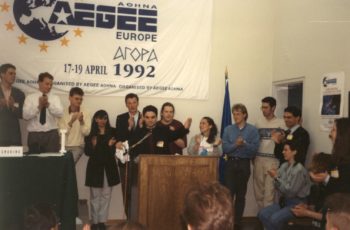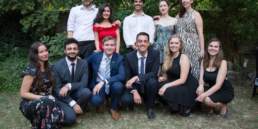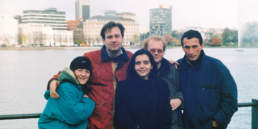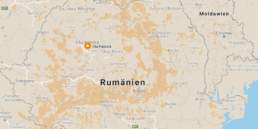The Quo Vadis election
The day the Berlin Wall crumbled, 9th of November 1989, AEGEE opened its doors to students in Central and Eastern Europe. The East-West Working Group and the Comité Directeur (CD) of 1990 – known as the “Quo Vadis” group – successfully promoted this new direction.
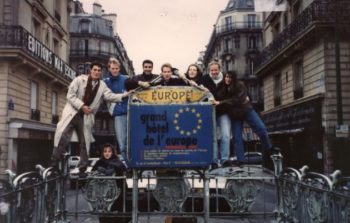
Their approach not only led to an extensive growth of the network, but also changed the understanding of Europe of all members in East and West. At the autumn Agora in Bonn in November 1990, the delegates approved opening up also to the USSR. AEGEE also started to extend to Northern Europe. In 1990, the first local was established in Finland (AEGEE-Turku/Abo). During the Bonn Agora also the current logo of AEGEE-Europe was introduced. It resembles a key, symbolising that AEGEE is a key to open up Europe.
In this time, AEGEE also changed the election system for the European board, the CD. As EGEE was founded, it had a CD of 20 full members and 10 suppléants – too many to have a functioning team. Therefore the number of CD members was reduced to 16 at the Salerno Agora in 1989. Still, the CD was elected as a list. This election principle made it hard for individuals to join the CD without the consent of the CD in charge. Still, at the Agora in Bonn, in November 1990, the “Quo Vadis” opposition list was elected. In his programme some of his main ideas were the stronger opening of AEGEE towards the whole continent, the change of the election to individual candidates and a better communication between the CD and the local branches.
The new CD had only few links to the old one. This turned out to be problematic, since AEGEE did not have a big headoffice at that time, where the whole CD worked and lived – so the CD members had most files at their homes. The new CD had a huge support of the network. Several CD members stayed on for more than a year. At the Agora in Amsterdam, April 1991, the election system was changed. Since that time, the CD members are elected separately and are individually responsible for their moral reports. The only exception was that the president and the secretary-general were elected as a couple, since it was assumed that they needed a very trustful relationship. Also this principle was skipped a few years later.
Statutory meetings in the East
AEGEE-Europe then supported the development in Central and Eastern Europe, especially by transferring major events to Eastern Europe like the Agorae in Budapest (November 1991) and Praha (April 1993) and the Presidents’ Meeting in Kraków (March 1992). In 1992, at the Agora in Kos, AEGEE-Istanbul was accepted to the AEGEE network and in 1995 through the acceptance of Ankara to the network, AEGEE became the first European students’ organisation to open up for Turkey.
In 1993, AEGEE organised its first Case Study Trip to Albania to explore the young Europeans’ daily life in the country. There were further Case Study Trips later to Ukraine, former Yugoslavia, Moldavia and Caucasus. However, despite the great success of this event type, where the participants usually had to do research work before the trip, it was not often repeated, because of the big amount of preparation work. The extensive growth of the network in the East changed the character of the network. Many creative ideas in the 1990s and early years of this decade were actually born in these locals where the idea of a unified Europe was a very strong vision.
Need for a stronger central administration
AEGEE received official recognition by OSCE in 1992 and obtained a special status with the Council of Europe in 1993. During 1993 at the European School in Valladolid an attempt was made to revive the idealistic AEGEE, with the motto “Mobility with a purpose”. The idea was to include all basic ideas of AEGEE into a common goal that everybody could work together for. For this co-ordination of AEGEE activities the introduction of the Year Plan, masterminded by CD member Philipp von Klitzing, was an important step.
On CD level, these times were restless. Between 1993 and 2001 not a single president officially stayed in office for more than six months. Another drawback was the fact that until the end of 1995 basically only the so-called “daily board” of president, treasurer and secretary was working in the AEGEE-Europe office, which was nothing else than one room, hosted by the University of Delft. Most of the other CD members – at that time a CD was composed out of 16 people – lived at home. E-mail was not common among CD members, a lot of work was done by phone, e-mail and fax. The CD usually met every one or two months at one of the major conferences of AEGEE. This meant, there was a lack of communication and co-ordination within the CD. At least this had the advantage that they were very close to the network and their problems.
Milestones
1990
- AEGEE expands also to the EFTA countries, for example to Scandinavia.
-
The CD tries to establish special rules for Central and Eastern European antennae, the PEACE-programme. Due to opposition, the idea gets dropped
- Growing disappointment in the network, because according to some members the CD is not reacting quick enough to the changes in CEEC
- AEGEE receives a new logo in the shape of a key. This logo is still in use
- At the autumn Agora in Bonn the CD has to face a lot of criticism. AEGEE-Bonn itself was one of the leading oppositional antennae towards the presidential attitude how AEGEE-Europe was run. In the past previous CDs tried to exclude AEGEE-Bonn and AEGEE-Aachen from the network.
- The autumn Agora sees the election victory of the Quo Vadis CD.
- The autumn Agora decides to accept also locals in the USSR.
- The Summer University coordination, which was CD task, is getting outsourced to the network: to AEGEE-Maastricht
- AEGEE successfully organises a new recruitment fair, called TEAM. Is is organised in northern Italy in cooperation with the Italian newspaper “Il sole 24 ore” – which dumps AEGEE in 1995.
1991
- AEGEE discusses to move the head office of the organisation to Brussels, because it is the center of the institutions in Europe. The idea is dropped due to too high costs
- AEGEE members Matthias Hinnah and Dinu Gherman start to use e-mail and propose to use it for AEGEE communication purposes. The system was called EARN and was only used by universities. AEGEE was one of the first organisations using it.
- The Blue Platform is established: a cooperation of AEGEE with similar NGOs in order to learn from eachother. After a while it stopped. Later, the European Union took the idea. Today, AEGEE is well established in such platforms and cooperates bilaterally also with other oorganisations such as BEST
- At the spring Agora AEGEE introduces individual elections. The previous list elections is abandoned, in which people had to search 16 suitable people with whom they wanted to cooperate and work in one CD. The old system blocked opposition.
- In Moscow the first AEGEE local from the former USSR is founded
- The autumn Agora takes places in Budapest. AEGEE-Budapest had just been established one year before and was after AEGEE-Leipzig the second local in Central and Eastern Europe and outside the European Community. In a panel discussion, people from the European Community, Hungary and AEGEE discuss the future of Europe. One of the main organsisers of the Agora is Zsuzsa Kigyos, who two years later becomes President of AEGEE-Europe.
1992
- The first Presidents’ Meeting (predecessor to today’s European Boards’ Meeting) in Central and Eastern Europe in Kraków underlines the importance of CEEC for AEGEE
-
The spring Agora takes place on the Greek island Kos. The fact that it took place during Easter leads to discussions. Conclusion: statutory meetings do not take place during high church holidays anymore.
- Jeroen Hoogerwerf becomes president. Until 2001 he is the last president who stays in his task for one full year. All others quit six months after their election.
- AEGEE receives consultative status with the OSCE.
- The main language of the statutes of AEGEE-Europe is changed from French to English. French becomes the language of the copy, because French is problematic for most members.
- The Year Plan (now: Action Agenda) is introduced as a tool to get more continuation in the activities of AEGEE and to give the antennae an idea about what topics they could organise activities.
- The first Key to Europe presents AEGEE to the outside world
1993

- AEGEE starts organising the Best Bulletin Award for the best local AEGEE publication. First winner is AEGEE-Enschede. Later winners are AEGEE-Tilburg, AEGEE-Athina, AEGEE-Skopje, AEGEE-Madrid and AEGEE-Maastricht
-
AEGEE organises the management game CHAMP. Michal Trochimczuk from AEGEE-Warszawa is the driving force behind it.
-
The Statement of Principles is created.
-
AEGEE creates a serious students magazine with only a minimum of AEGEE content, but a lot about European issues: the OneEurope Magazine. It started in Aachen by people like Michael Waibel and Philipp von Klitzing.
-
At the autumn Agora AEGEE gets four new Honorary Members. These four people were a mirror of AEGEE: Georgina von der Gablentz is honoured for leading the Quo Vadis CD. Michael Merker for his involvement in the expansion to the East. Vitorrio dell’Aquila for being AEGEE’s one-person Summer University Coordination Team. Jeroen Hoogerwerf gers honoured for his service as Agora chairman and AEGEE-Europe President. Befotre that AEGEE had only one Honorary Member: Franck Biancheri.
1994

- AEGEE-Europe gets its first website. It was made by AEGEE-Konstanz menber Jens-Erik Weber
- Human Right become Year Plan topic. AEGEE-Europe President Zsuzsa Kigyos takes part in an anti-discrimination forum in Strasbourg
-
AEGEE creates another publication, this time a newsletter for external contactds: the AEGEE Gazette. It was invented and made by later AEGEE-Europe President Dorian Selz.
- The first of many discussions about membership fees. AEGEE-Enschede wants to abolish the upper limit of 20 Euro in order to be able to ask for higher fees. The proposal at the spring Agora fails.
- AEGEE introduces the Long Term Plan (LTP), an initiative by Philipp von Klitzing. Several European instututions asked for these plans. The LTP vallows for more continuity, but does not work in practice, since it is very vague.
- At the autumn Agora in Montpellier the re-elected President of AEGEE-Europe, Dorian Selz, resigns on the spot after he received only 52 percent of the votes. An emergency election takes place. Paw Hammerlund Andersen candidates, but withdraws. Finally Christina Thorsson (now: Wejshammer) is elected. The result is announced on the marketplace in front of the building, since the Agora participants have to leave it.
1995
- AEGEE turns ten years old. This is celebrated with several forums, a festival in Antalya, a Tour d’Europe and a final conference with 300 participants in Groningen.
- The autumn Agora decides to move the AEGEE-Europe Head office to Brussels
-
Ankara and several other Turkish antennae join the network. Cyprus is not yet admitted to the network.
-
The 10th Anniversary Book is published. It costs a lot, but has a huge impact on external relations
-
AEGEE organises a two-week long Case Study Trip (CST) to Ukraine. The event is organised by David Stulik. A previous CST went to Albania.
-
AEGEE-Bucuresti gets excluded from the network for visa abuse. The antenna is successfully refounded in 1996 by Lia Potec. Previously AEGEE-Moskva was deleted because members used the Summer University to gain personal profits.
-
AEGEE-Europe becomes member of the youth platform ECB.
(History overview by Edwin Janssen)
[nggallery id=3]
The Event Highlights of 1990
Month City Title
January Enschede (NL) European IT Market
All over Europe Environmental Week in 17 cities
Bonn (D) Fortress Europe?
February Amsterdam (NL) Japan - A Magic World
March München (D) Presidents' Meeting
Leiden (NL) Culture Clash in Economic Cooperation
April Madrid (E) Is Europe Forgetting Latin America?
Rotterdam (NL) Mergers and Acquisitions
May Paris (F) Agora & EGEE VI - Europe is Our Time
Berlin (D) A European Future for German Question
Saarbrücken (D) Education, Invention & Innovation
September Karlsruhe (D) Presidents' Meeting
October Utrecht (NL) Eurolawyers & Euroculture
Nijmegen (NL) European Media Policy
Mainz (D) The European Wine Market
November München&Salzburg (D/A) East-West Relations
Bonn (D) Agora
December Milano (I) TEAM 90 - European Academic Manager
Salamanca (E) University in the 21st Century Europe
The Event Highlights of 1991
February Groningen (NL) Presidents' Meeting
Groningen (NL) Corporate Communication
March Utrecht (NL) Moot Court Finals
Perugia (I) Non EC Immigration in EC Countries
April Ferrara (I) Love Education - Birth Control
Poznan (PL) AIDS in Europe
Amsterdam&Leiden (NL) EGEE VII - Energy & Europe
Amsterdam (NL) Agora
Münster (D) First Environmental Congress
May All over Europe Environmental Week
Bonn (D) How to do Culture in Three Days?
June Heidelberg (D) Scandinavian Congress
Passau (D) Europe - it's Music
July Madrid (E) European School
September Oviedo (E) Erasmus Academy
October Bordeaux (F) Presidents' Meeting
Koblenz (D) Rhine & Dine
Salzburg&Debrecen (A/H) East-West Relations Academy
November Saarbrücken (D) Men & Women - Never-ending Story
Geneve&Fribourg (CH) Erasmus Congress
Köln (D) Modern Literature in Europe
Budapest (H) Agora
December Milano (I) Job-fair Team 91
Hamburg (D) Poland and the EC
The Event Highlights of 1992
February Tallinn (EE) Ecological Crisis
Freiburg (D) The United States of Europe?
March Perugia&Leiden (I/NL) Education and Quality I
Krakow (PL) Presidents' Meeting
Leuven (B) Europe of the Regions Academy
Ljubljana (SI) Slovenia in Europe
Luxembourg (LUX) Moot Court Final
April München (D) Europe of the Regions Congress
Sofia (BG) Integration on the Balkans & EC
Kós/Athens (GR) Agora
Riga (LV) Second Environmental Congress
Erlangen/Nürnberg (D) Communication & New Media
Amsterdam (NL) Africa: Now or Never
All over Europe Third Environmental Week
May Perugia&Leiden (I/NL) Education and Quality II
Leipzig (D) The Cultural Clash of Religions
June Maastricht (NL) Food 93: Politics, Economics & Nutrition
July Madrid (E): European School
August Oviedo (E): Environmental Academy
October Turku (FIN) Presidents' Meeting
Milano (I) Africa in Europe - a Challenge
Amsterdam (NL) AIDS
November Praha (CZ) Quo Vadis Czechoslovakia?
Budapest (H) Tempus Academy
Delft (NL) Agora
December Milano (I) Team 92
The Event Highlights of 1993
February Aachen (D) Presidents - Meeting
Hamburg (D) "Die Hanse" in Northern Europe
Nijmegen (NL) Crime in Europe
Berlin (D) European School
March Aalborg&Trondheim (DK/N) Erasmus Academy&Congress
Cluj-Napoca (RO) European Health Care
April Gorizia (I) Africa Today
Konstanz (D) Traffic
Praha (CZ) Agora
May London (UK) CHAMP 93 Finals
Fribourg (CH) Journee de l'Europe
München (D) ECU
Köln (D) Europe & Islamic Cultures
Maastricht (NL) European Art United
June Heidelberg (D) Anti-Semitism in Europe Today
September Santander (E) Presidents' Meeting
October Groningen (NL) Japanese Companies in Europe
Gliwice (PL) Ecology
November Utrecht (NL) Agora & European Communication
Sevilla (E) Renewable Energy
Barcelona (E) The Mediterranean Area
Nijmegen (NL) Realising European Advertising
Freiburg (D) Xenophobia! Are You a Racist?
December Milano (I) Team 93
Bratislava (SK) Post-revolutionary Eastern Europe
The Event Highlights of 1994
January Kraków (PL) New Europe - New Law
München (D) Simulation of the EC
February Budapest (H) Ethnic and National Minorities
March Luxembourg (LUX) Moot Court
Eger (H) Presidents' Meeting & Integration in the Province
Hamburg (D) Mass Media in Europe
April Istanbul (TR) The New World (Dis)Order
München (D) Agora
Delft (NL) Potential of Renewable Energy
May Geneve (CH) Humanitarian Action - How?
Cluj-Napoca (RO) Foreign Investment in Eastern Europe
Mainz/Wiesbaden (D) Europe and Latin America
London (UK) CHAMP European Finals
June Rennes (F) European School
September Helsinki (FIN) Presidents' Meeting
October Enschede/Warszawa (NL/PL) Central Europe Limited
Eindhoven (NL) Addiction and its Place in Society
All over Europe Europe Against Discrimination
Tilburg (NL): Ex-Yugoslavia Causes & Consequences
November Montpellier (F) Agora
Edinburgh (UK) Europe on the Brink
Augsburg (D) Terrorising Advertising
Bologna (I) EGEE X - Dimension in Education
December Enschede (NL) Asia, a Changing World
The Event Highlights of 1995
January Erlangen/Nürnberg (D) Disabled in Europe
February Ljubljana (SI) Presidents' Meeting
Szeged (H) Historical Changes in Central Europe
Bratislava (SK) Love Academy
March Passau (D) Europe - Past and Future
Berlin (D) Spring University
Maastricht (NL) Moot Court Finals
Wien (A) Environment in Eastern & Central Europe
Cluj-Napoca (RO) Mathematic on Practical Problems
Salamanca (E) Manipulation and Mass Media
Bonn (D) Drowned by Information
April Amsterdam (NL) Agora
Skopje (MK) Privatisation in CEEC
Brussel (B) 10th Anniversary Reception
May Timisoara (RO) Development Without Pollution?
June Hamburg (D) African Cultures in Europe
July Freiburg to Maastricht (D/NL) Tour d'Europe
August Ankara (TR) 10th Anniversary Festival in Antalya
September Barcelona (E) President's Meeting
Lviv&Kyiv (UA) EWWG Case Study Trip Ukraine
Aachen (D) North-South: Play Fair Europe!
October Milano (I) Recycling Tour - Waste Management
November Budapest (H) Agora
Kobenhavn (DK) Education and Discrimination
Grenoble (F) European Culture: Myth or Reality?
December Groningen (NL) 10th Anniversary Final Conference


